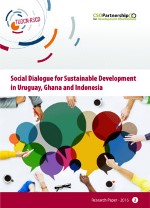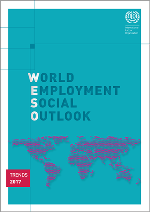Social Watch News
Published on Fri, 2017-02-03 09:20
TUDCN has undertaken three national case studies in Ghana, Indonesia and Uruguay to analyse social dialogue within the countries in its various forms, with particular focus on the formalisation of these dialogues at different administrative levels and its contribution to development. The studies are authored by national trade union specialists and include examples of good practice as well as of limitations of the different contexts. |
Published on Fri, 2017-02-03 08:49
Thirty civil society organisations (CSOs) from across the world working on global health issues have made a strong call for the deferment of a decision on the Bill and Melinda Gates Foundation's application for official relations with the World Health Organization (WHO). The CSO demand for deferment is based on the conflict of interest emerging from Gates Foundation's official relations with the WHO. |
Published on Thu, 2017-02-02 08:04
The open-ended working group (OEIGW) on transnational corporations (TNCs) and other business enterprises with respect to human rights successfully held its second meeting in October 2016, in Geneva. The OEIGW was established by a Human Rights Council resolution adopted in July 2014. According to this resolution, the next meeting of the OEIGW, expected in October 2017, will see the Chairperson rapporteur “prepare elements for the draft legally binding instrument [on TNCs and other business enterprises with respect to human rights] for substantive negotiations” (hereinafter referred to as “the Instrument” or “binding Instrument”). |
|
Published on Fri, 2017-01-27 15:20
» |
Published on Thu, 2017-01-26 19:14
The global unemployment rate is expected to rise modestly to 5.8 per cent in 2017, representing an increase in the number of unemployed globally of 3.4 million compared with 2016, the International Labour Organisation (ILO) has said. In its World Employment and Social Outlook - Trends 2017 report released recently, the ILO said that this will bring total unemployment to 201.1 million in 2017. The ILO further said that the global unemployment rate is then expected to hold relatively steady in 2018, as the economic outlook improves, although the pace of labour force growth will still outstrip employment creation, resulting in an additional 2.7 million unemployed people. |
Published on Thu, 2017-01-26 18:52
This year, our organization, Inclusive Development International, launched the Follow the Money initiative – a new tool to fight land grabs and other corporate abuses. It’s a simple idea, but we believe it has the potential to be a game-changer. Every year, more than 15 million people are forcibly displaced from their land, housing and the natural resources they depend upon to make way for large-scale agro-industrial plantations, hydropower dams, mines and power plants. Rarely are they compensated for what they have lost. |
Published on Thu, 2017-01-26 16:27
In various remarks in the last few days, Argentine government officials have insisted upon blaming foreign-born people for drug trafficking in our country. Security Minister Patricia Bullrich used skewed and decontextualized statistics and stigmatizing assertions to try to justify a toughening of the nation’s immigration policy, which the government has been announcing for several weeks. |
|
Source: . Published on Sat, 2016-12-31 00:00
As many of our friends and affiliates know, Global Action’s lens on peace and security has broadened over the years, moving beyond weapons to what many diplomats at the UN refer to as the “root causes” of conflict — from persistent poverty and habitat loss to climate impacts and discrimination based on ethnicity, gender and religion. Security question permeate (or should) much of what the UN does, including the provision of humanitarian assistance, the health of our oceans, the political enfranchisement of youth and the protection of children in conflict zones. |
Published on Mon, 2016-12-19 14:07
In an unprecedented and historic move, the Sixth Committee of the UN General Assembly recently granted observer status to the International Chamber of Commerce (ICC). The resolution was submitted by France, Albania, Colombia, the Netherlands and Tunisia and was adopted during the seventy-first session of the General Assembly. The resolution sets out the ICC’s position as observer in the General Assembly from 1 January 2017 on. |
Published on Fri, 2016-12-16 12:59
The "refinement" of the SDG indicators by experts can dilute the goals agreed by the governments, said civil society representatives as preparations advance to the 48th session of the UN Statistical Commission in March 2017. For example, under target 10.5, to improve the regulation and monitoring of global financial markets, the proposed indicator #10.5.1: “Adoption of global financial transaction tax (Tobin tax)” was changed to “Financial Soundness Indicators”, developed by the IMF. |
SUSCRIBE TO OUR NEWSLETTER









